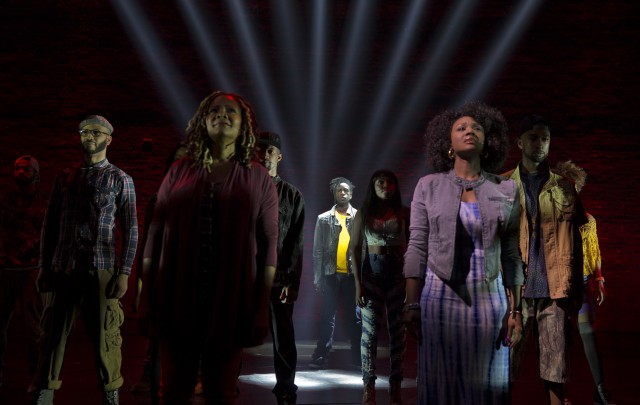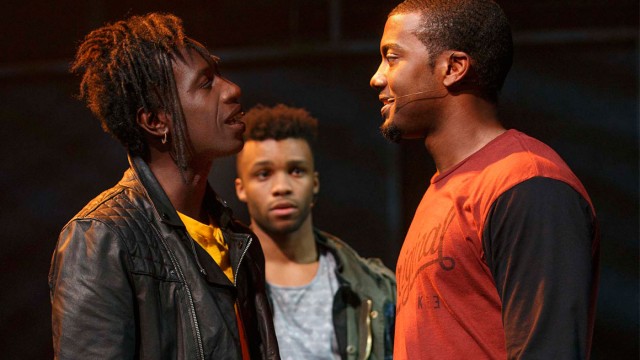
New musical uses Tupac Shakur’s lyrics to tell contemporary tale of hard life (photo by Joan Marcus)
Palace Theatre
1654 Broadway at West 47th St.
Thursday – Tuesday through January 4, $67.75 – $184.25
www.hollerifyahearme.com
The new musical Holler If Ya Hear Me might be based on the songs of Tupac Shakur, but it does not tell the life story of the controversial West Coast rapper who was shot and killed in a Las Vegas drive-by in 1996 at the age of twenty-five. Instead, book writer Todd Kreidler — introduced to Shakur’s music by friend and mentor August Wilson — uses Shakur’s lyrics to share a contemporary tale about life in a ghetto in an unnamed Midwestern industrial city. As the play opens, John (Slam star Saul Williams) descends from the heavens in a jail cell, evoking Shakur’s several stints in prison, while delivering the East Harlem native’s “My Block,” soon joined by the company, setting the mood with the posthumously released song about guns, crack, black-on-black crime, unemployment, economic hardship, and racism. After his innocent brother, Benny (Donald Webber Jr.), is shot and killed, Vertus (Christopher Jackson) is determined to get even with the members of the 4-5 gang who took out Benny, angering his mother (Tonya Weston), alienating his girlfriend, Corinne (Saycon Sengbloh), and energizing young Anthony (Dyllon Burnside), who wants revenge as well. Meanwhile, the moody, humorless John is looking to go straight, getting a job working in Griffy’s (Ben Thompson) car-salvage business, where Benny used to work, planning with the white Griffy to get out of the neighborhood together. Through it all, a decrepit old man (John Earl Jelks) calls for peace by writing on walls and preaching through a megaphone.

John (Saul Williams) and Darius (Joshua Boone) get down to serious business as Anthony (Dyllon Burnside) looks on in HOLLER IF YA HEAR ME (photo by Joan Marcus)
The first act of Holler If Ya Hear Me is a mess, with a confusing narrative and point of view, a kind of mishmash of West Side Story and In the Heights, but director Kenny Leon (A Raisin in the Sun, Stick Fly) brings things together in act two, focusing more on the individual stories of John, Griffy, and especially Vertus, with stand-out performances by Williams, Thompson, and Jackson. Daryl Waters’s orchestrations too often emphasize Shakur’s background use of R&B elements, Broadway-fying such songs as “I Ain’t Mad at Cha,” “Me Against the World,” “Dear Mama,” and “Unconditional Love”; Wayne Cilento’s (Wicked, Jersey Girls) choreography is almost nonexistent; and Edward Pierce’s set design is essentially a bare stage with stoops and a fenced-in salvage show occasionally, sometimes randomly, wheeled in, but Leon and the company still manage to pull it all off in the end while setting a new high for the use of the N-bomb on the Great White Way. The Palace Theatre itself has been transformed for the show, with stadium seating in the front of the tiny orchestra, while the rear has been turned into an interactive exhibition curated by the National Museum of Hip-Hop.